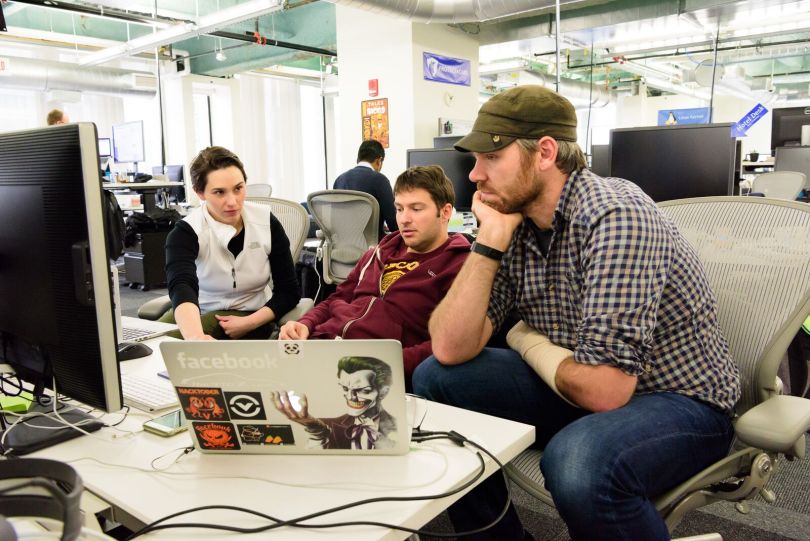
Working at a tech company with the stature of Facebook is probably a dream for many engineers.
And thanks to the social media giant returning to its Cambridge roots just a few years ago, many of Boston’s brightest will get the chance.
In August 2017, Facebook’s Kendall Square office announced plans to hire 500 individuals to work on everything from machine learning to delivering internet access to the 4 billion people worldwide who currently live without it. We caught up with three members of the Facebook Cambridge engineering team to get a better understanding of what it’s like to work there.
While you might expect working at one of the best-known tech companies on the planet to feel — well — corporate, you might be surprised to find out that Facebook strives to maintain a ‘startup-like’ feel where employees are encouraged to pitch ideas, as well as grow professionally by developing new skill sets as they move around the company, gaining experience in a variety of roles.
“Facebook has the brightest set of people I’ve ever worked with,” said software engineer Chris Kappler. “It’s an engineering-driven company. A killer idea could come from anyone, regardless of which level they’re at within the company. Facebook is structured to enable that type of creativity. There’s not a lot of hierarchy or friction. If you have an idea, build it and you’ll get people on board with it.”
Software engineer Laney Kuenzel Zamore said the engineering team’s entrepreneurial vibe starts with how Facebook trains new employees.
“There’s a program called ‘Bootcamp’ and it lasts anywhere from six to eight weeks,” Zamore said. During this timeframe, each new engineer is paired with a mentor who helps familiarize them with all things Facebook, assigning classes for them to take and tasks to perform around the company, all with the design of bringing them up to speed on processes, culture and more.
After graduating from this employee orientation, the engineer is empowered to decide which team they wish to join.
“You don’t get assigned to a team and stay on that team the whole time,” Zamore said. “You come in and you’re encouraged to change teams based on your interests. There’s a lot of flexibility to switch projects, allowing you to stay fresh in what you’re learning and doing.”
And when it comes to ‘doing,’ the Facebook Cambridge engineering team has its hands pretty full.
Kappler, a member of the ‘Traffic’ team, said his main job is to make sure our Facebook experience is as smooth and natural as possible, no matter where you are in the world.
“If you use Instagram, WhatsApp, Oculus or Facebook, we want you to get your photos, videos, messages and posts quickly,” Kappler said. “A big part of solving this is putting servers close to you and getting those machines to deliver your content as soon as possible.”
When he’s not writing code, measuring network performance or updating configurations, Kappler said he also reserves time for learning and idea creation. Some of this work involves collaborating working on Facebook’s ‘Connectivity Lab,’ which is developing ways to make internet access affordable in communities all over the world by employing technologies such as satellites, lasers, as well as high-altitude, long-endurance planes.
Meanwhile, Zamore said she spends much of her time using Facebook technology to make it easy for the product teams to build real-time features that make people’s overall Facebook experiences better.
“I’m proud that we’ve built a system (GraphQL Subscriptions) that works well for a wide variety of real-time use cases, ranging from very high-volume products, including live video comments, as well as features within Facebook’s internal tools,” Zamore said. “I’m also proud that we’ve open sourced our work so that others can benefit from it and contribute back to it.”
It depends on the phase of the project, but Zamore said some days involve relatively little coding and she ends up spending more time on collaboration, understanding what a partner team needs and delivering.
Coding or not, Kappler and Zamore said working at Facebook was more or less what they expected — but better.
“Facebook is all of the things that I expected and beyond,” Kappler said. “I expected to learn a lot, but I didn’t expect to be at a knowledge deficit all of the time. I expected to deal with large-scale systems, but until you’ve pushed the button to modify a code path for Facebook, you haven’t really thought about the relationship between software efficiency and megawatts of power. I expected to meet smart people, but I didn’t expect to meet people with superpowers.”
If working at the tech giant has always been your dream, now might be a wise time to submit your resume.
Ryan Mack, Facebook Boston site lead, said the office is aggressively recruiting, and looking for collaborative, hardworking engineers who believe in the company’s mission: connecting the rest of the world.
“Having the opportunity to work with really excellent engineers is unique,” Mack said. “And doing that in an environment that provides educational opportunities and encourages employees to tackle real-world challenges is rare.”



